An Analysis of the Gender Pay Gap in Sociology of Work, Spring 2019
VerifiedAdded on 2023/04/24
|5
|1370
|73
Essay
AI Summary
This essay critically analyzes the gender pay gap, a significant issue of social inequality in the workplace, from a sociological perspective. It examines the historical context of women's roles in organizations, highlighting the shift from exclusion to unequal pay, and discusses the concept of the gender wage gap, differentiating between unadjusted and adjusted pay gaps. The essay explores relevant sociological theories, including feminism, conflict theory, and the different waves of feminism, to explain the underlying causes and societal impacts of the pay gap. It references key literature and scholarly articles to support its arguments and concludes by summarizing the factors contributing to the gender pay gap and the influence of feminism in addressing workplace inequalities. The essay covers the different phases of feminism in the United Kingdom and their impact on society.
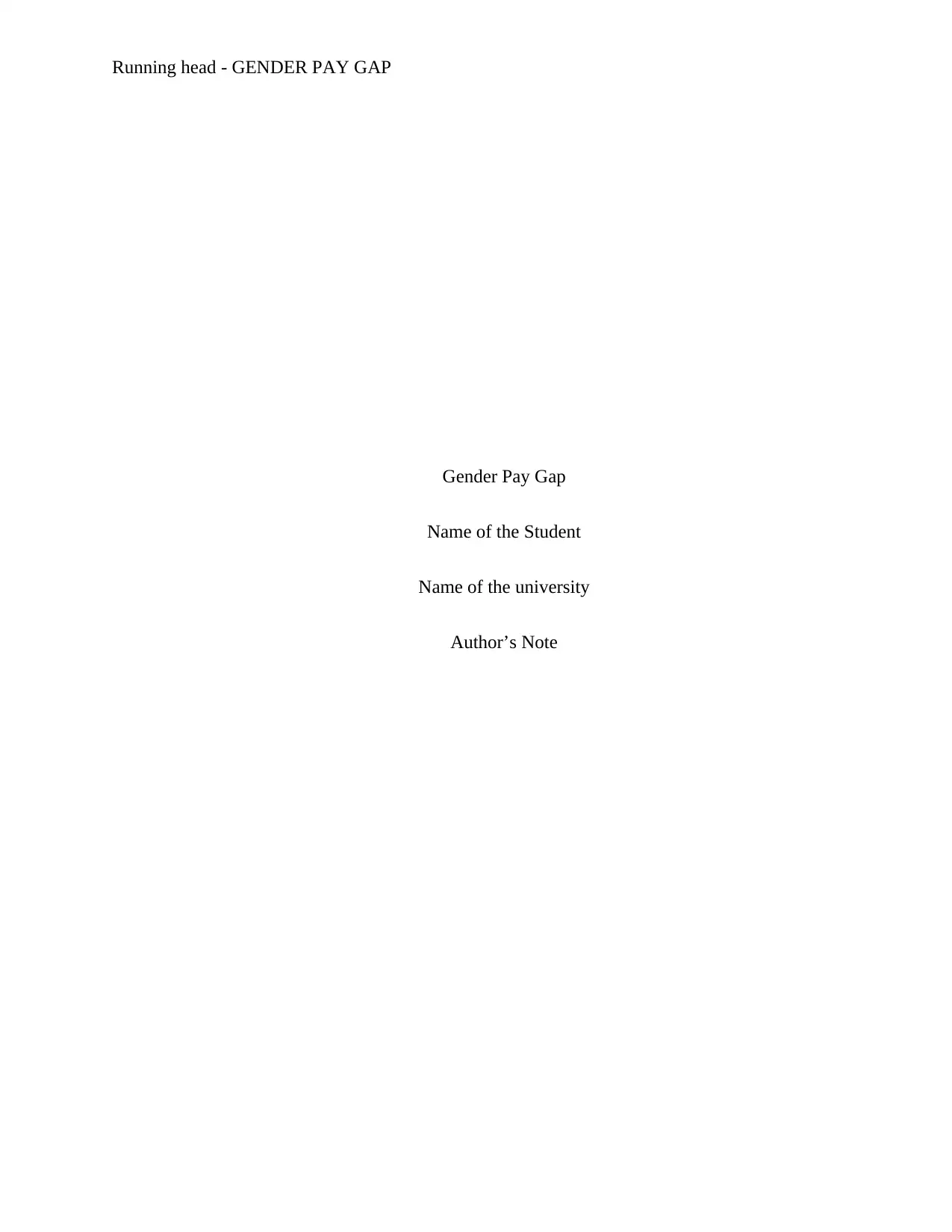
Running head - GENDER PAY GAP
Gender Pay Gap
Name of the Student
Name of the university
Author’s Note
Gender Pay Gap
Name of the Student
Name of the university
Author’s Note
Paraphrase This Document
Need a fresh take? Get an instant paraphrase of this document with our AI Paraphraser
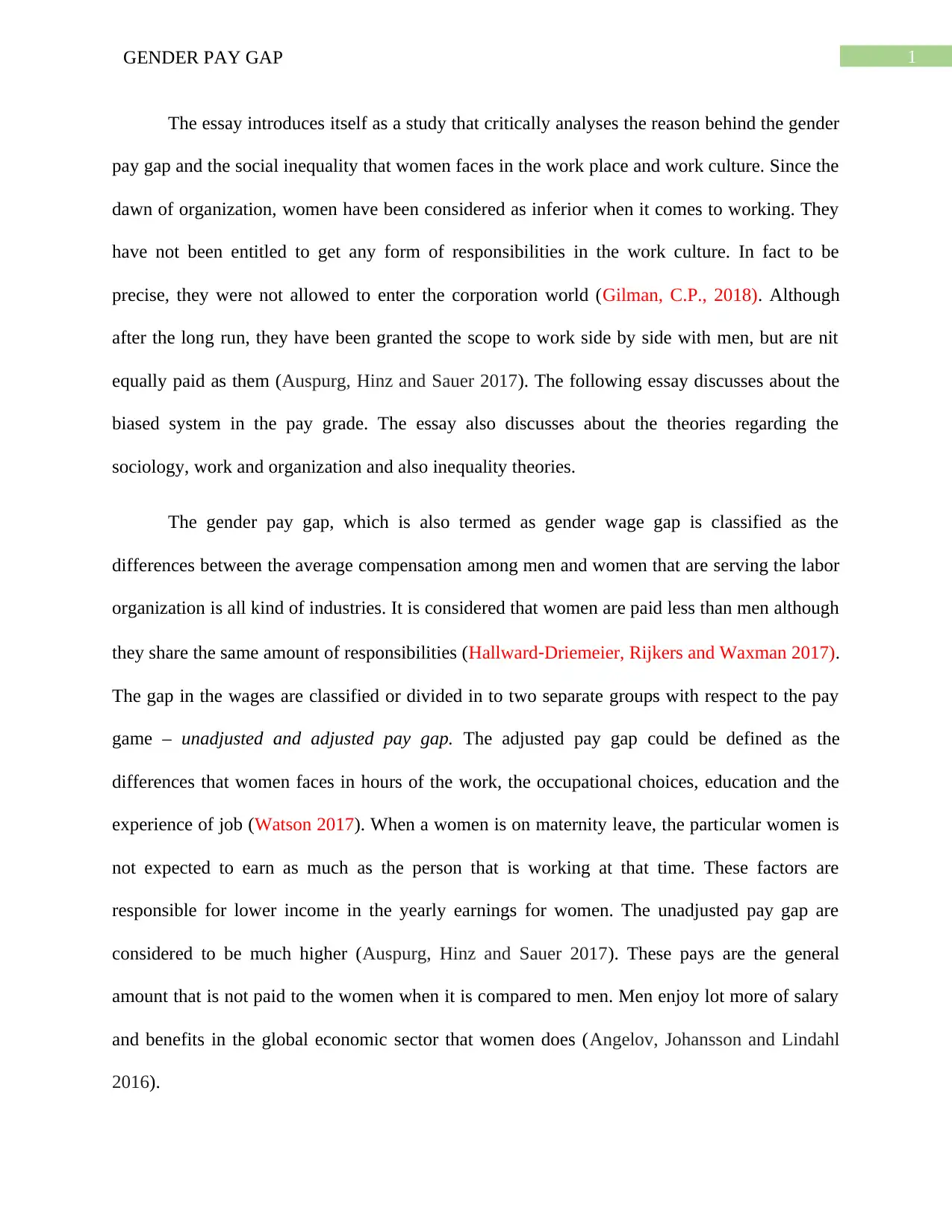
1GENDER PAY GAP
The essay introduces itself as a study that critically analyses the reason behind the gender
pay gap and the social inequality that women faces in the work place and work culture. Since the
dawn of organization, women have been considered as inferior when it comes to working. They
have not been entitled to get any form of responsibilities in the work culture. In fact to be
precise, they were not allowed to enter the corporation world (Gilman, C.P., 2018). Although
after the long run, they have been granted the scope to work side by side with men, but are nit
equally paid as them (Auspurg, Hinz and Sauer 2017). The following essay discusses about the
biased system in the pay grade. The essay also discusses about the theories regarding the
sociology, work and organization and also inequality theories.
The gender pay gap, which is also termed as gender wage gap is classified as the
differences between the average compensation among men and women that are serving the labor
organization is all kind of industries. It is considered that women are paid less than men although
they share the same amount of responsibilities (Hallward‐Driemeier, Rijkers and Waxman 2017).
The gap in the wages are classified or divided in to two separate groups with respect to the pay
game – unadjusted and adjusted pay gap. The adjusted pay gap could be defined as the
differences that women faces in hours of the work, the occupational choices, education and the
experience of job (Watson 2017). When a women is on maternity leave, the particular women is
not expected to earn as much as the person that is working at that time. These factors are
responsible for lower income in the yearly earnings for women. The unadjusted pay gap are
considered to be much higher (Auspurg, Hinz and Sauer 2017). These pays are the general
amount that is not paid to the women when it is compared to men. Men enjoy lot more of salary
and benefits in the global economic sector that women does (Angelov, Johansson and Lindahl
2016).
The essay introduces itself as a study that critically analyses the reason behind the gender
pay gap and the social inequality that women faces in the work place and work culture. Since the
dawn of organization, women have been considered as inferior when it comes to working. They
have not been entitled to get any form of responsibilities in the work culture. In fact to be
precise, they were not allowed to enter the corporation world (Gilman, C.P., 2018). Although
after the long run, they have been granted the scope to work side by side with men, but are nit
equally paid as them (Auspurg, Hinz and Sauer 2017). The following essay discusses about the
biased system in the pay grade. The essay also discusses about the theories regarding the
sociology, work and organization and also inequality theories.
The gender pay gap, which is also termed as gender wage gap is classified as the
differences between the average compensation among men and women that are serving the labor
organization is all kind of industries. It is considered that women are paid less than men although
they share the same amount of responsibilities (Hallward‐Driemeier, Rijkers and Waxman 2017).
The gap in the wages are classified or divided in to two separate groups with respect to the pay
game – unadjusted and adjusted pay gap. The adjusted pay gap could be defined as the
differences that women faces in hours of the work, the occupational choices, education and the
experience of job (Watson 2017). When a women is on maternity leave, the particular women is
not expected to earn as much as the person that is working at that time. These factors are
responsible for lower income in the yearly earnings for women. The unadjusted pay gap are
considered to be much higher (Auspurg, Hinz and Sauer 2017). These pays are the general
amount that is not paid to the women when it is compared to men. Men enjoy lot more of salary
and benefits in the global economic sector that women does (Angelov, Johansson and Lindahl
2016).
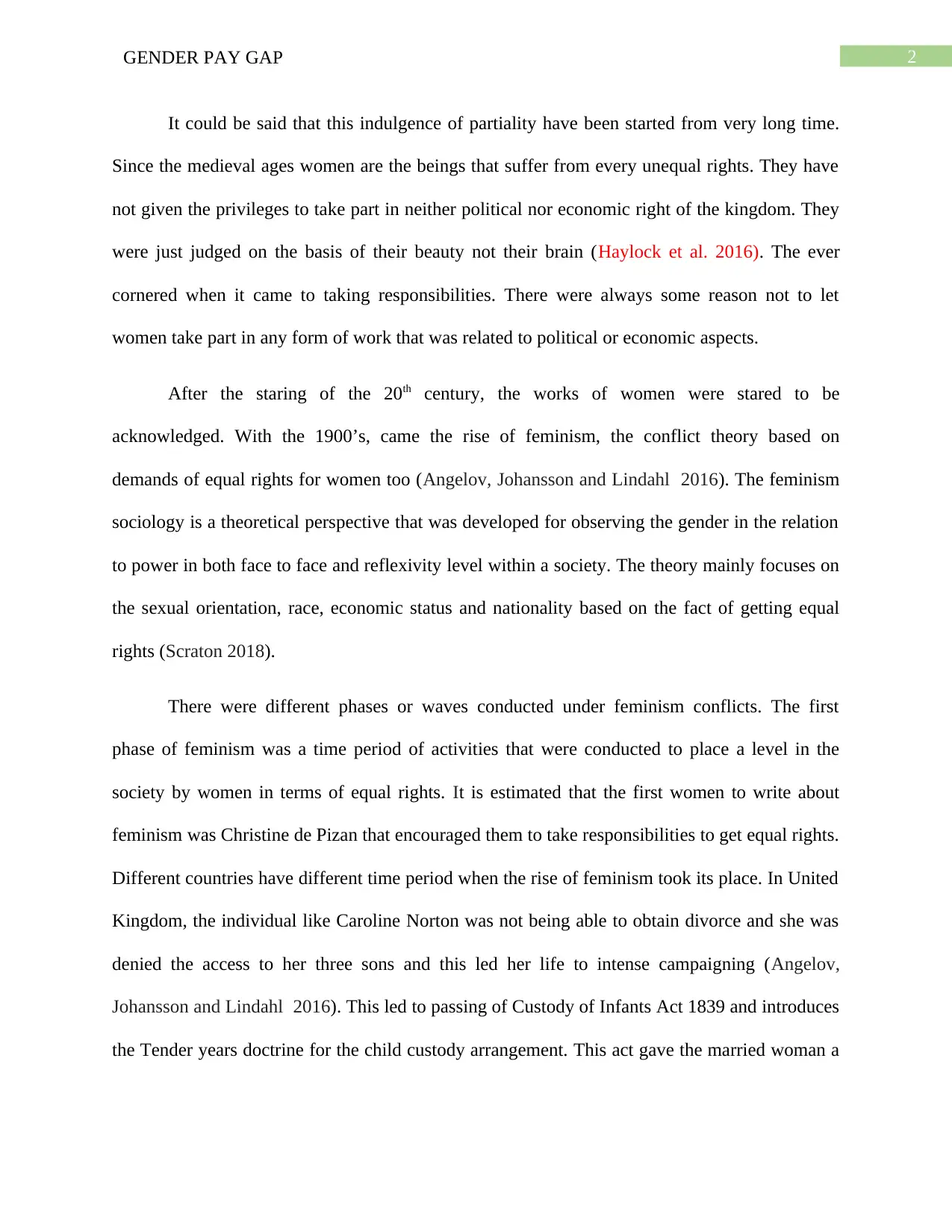
2GENDER PAY GAP
It could be said that this indulgence of partiality have been started from very long time.
Since the medieval ages women are the beings that suffer from every unequal rights. They have
not given the privileges to take part in neither political nor economic right of the kingdom. They
were just judged on the basis of their beauty not their brain (Haylock et al. 2016). The ever
cornered when it came to taking responsibilities. There were always some reason not to let
women take part in any form of work that was related to political or economic aspects.
After the staring of the 20th century, the works of women were stared to be
acknowledged. With the 1900’s, came the rise of feminism, the conflict theory based on
demands of equal rights for women too (Angelov, Johansson and Lindahl 2016). The feminism
sociology is a theoretical perspective that was developed for observing the gender in the relation
to power in both face to face and reflexivity level within a society. The theory mainly focuses on
the sexual orientation, race, economic status and nationality based on the fact of getting equal
rights (Scraton 2018).
There were different phases or waves conducted under feminism conflicts. The first
phase of feminism was a time period of activities that were conducted to place a level in the
society by women in terms of equal rights. It is estimated that the first women to write about
feminism was Christine de Pizan that encouraged them to take responsibilities to get equal rights.
Different countries have different time period when the rise of feminism took its place. In United
Kingdom, the individual like Caroline Norton was not being able to obtain divorce and she was
denied the access to her three sons and this led her life to intense campaigning (Angelov,
Johansson and Lindahl 2016). This led to passing of Custody of Infants Act 1839 and introduces
the Tender years doctrine for the child custody arrangement. This act gave the married woman a
It could be said that this indulgence of partiality have been started from very long time.
Since the medieval ages women are the beings that suffer from every unequal rights. They have
not given the privileges to take part in neither political nor economic right of the kingdom. They
were just judged on the basis of their beauty not their brain (Haylock et al. 2016). The ever
cornered when it came to taking responsibilities. There were always some reason not to let
women take part in any form of work that was related to political or economic aspects.
After the staring of the 20th century, the works of women were stared to be
acknowledged. With the 1900’s, came the rise of feminism, the conflict theory based on
demands of equal rights for women too (Angelov, Johansson and Lindahl 2016). The feminism
sociology is a theoretical perspective that was developed for observing the gender in the relation
to power in both face to face and reflexivity level within a society. The theory mainly focuses on
the sexual orientation, race, economic status and nationality based on the fact of getting equal
rights (Scraton 2018).
There were different phases or waves conducted under feminism conflicts. The first
phase of feminism was a time period of activities that were conducted to place a level in the
society by women in terms of equal rights. It is estimated that the first women to write about
feminism was Christine de Pizan that encouraged them to take responsibilities to get equal rights.
Different countries have different time period when the rise of feminism took its place. In United
Kingdom, the individual like Caroline Norton was not being able to obtain divorce and she was
denied the access to her three sons and this led her life to intense campaigning (Angelov,
Johansson and Lindahl 2016). This led to passing of Custody of Infants Act 1839 and introduces
the Tender years doctrine for the child custody arrangement. This act gave the married woman a
⊘ This is a preview!⊘
Do you want full access?
Subscribe today to unlock all pages.

Trusted by 1+ million students worldwide
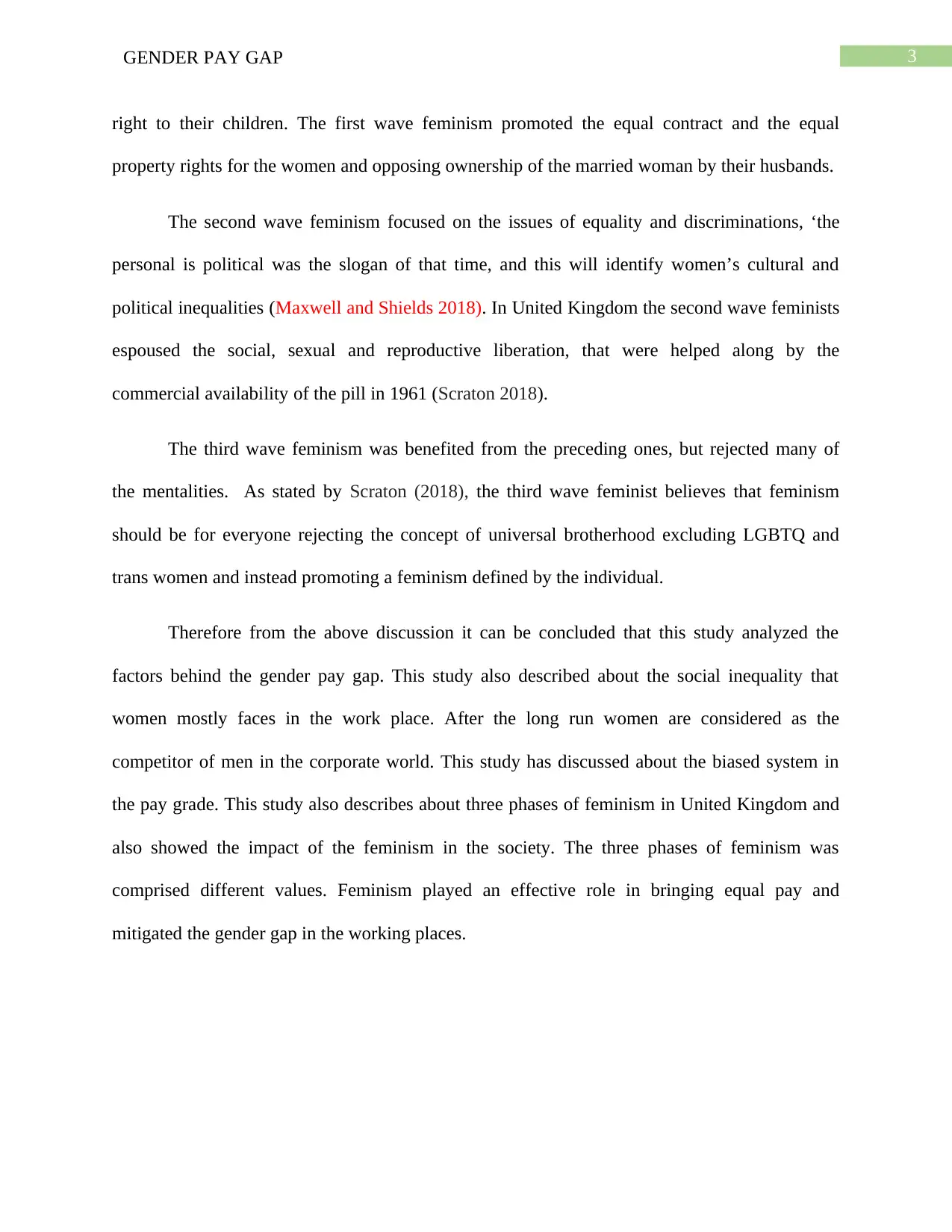
3GENDER PAY GAP
right to their children. The first wave feminism promoted the equal contract and the equal
property rights for the women and opposing ownership of the married woman by their husbands.
The second wave feminism focused on the issues of equality and discriminations, ‘the
personal is political was the slogan of that time, and this will identify women’s cultural and
political inequalities (Maxwell and Shields 2018). In United Kingdom the second wave feminists
espoused the social, sexual and reproductive liberation, that were helped along by the
commercial availability of the pill in 1961 (Scraton 2018).
The third wave feminism was benefited from the preceding ones, but rejected many of
the mentalities. As stated by Scraton (2018), the third wave feminist believes that feminism
should be for everyone rejecting the concept of universal brotherhood excluding LGBTQ and
trans women and instead promoting a feminism defined by the individual.
Therefore from the above discussion it can be concluded that this study analyzed the
factors behind the gender pay gap. This study also described about the social inequality that
women mostly faces in the work place. After the long run women are considered as the
competitor of men in the corporate world. This study has discussed about the biased system in
the pay grade. This study also describes about three phases of feminism in United Kingdom and
also showed the impact of the feminism in the society. The three phases of feminism was
comprised different values. Feminism played an effective role in bringing equal pay and
mitigated the gender gap in the working places.
right to their children. The first wave feminism promoted the equal contract and the equal
property rights for the women and opposing ownership of the married woman by their husbands.
The second wave feminism focused on the issues of equality and discriminations, ‘the
personal is political was the slogan of that time, and this will identify women’s cultural and
political inequalities (Maxwell and Shields 2018). In United Kingdom the second wave feminists
espoused the social, sexual and reproductive liberation, that were helped along by the
commercial availability of the pill in 1961 (Scraton 2018).
The third wave feminism was benefited from the preceding ones, but rejected many of
the mentalities. As stated by Scraton (2018), the third wave feminist believes that feminism
should be for everyone rejecting the concept of universal brotherhood excluding LGBTQ and
trans women and instead promoting a feminism defined by the individual.
Therefore from the above discussion it can be concluded that this study analyzed the
factors behind the gender pay gap. This study also described about the social inequality that
women mostly faces in the work place. After the long run women are considered as the
competitor of men in the corporate world. This study has discussed about the biased system in
the pay grade. This study also describes about three phases of feminism in United Kingdom and
also showed the impact of the feminism in the society. The three phases of feminism was
comprised different values. Feminism played an effective role in bringing equal pay and
mitigated the gender gap in the working places.
Paraphrase This Document
Need a fresh take? Get an instant paraphrase of this document with our AI Paraphraser
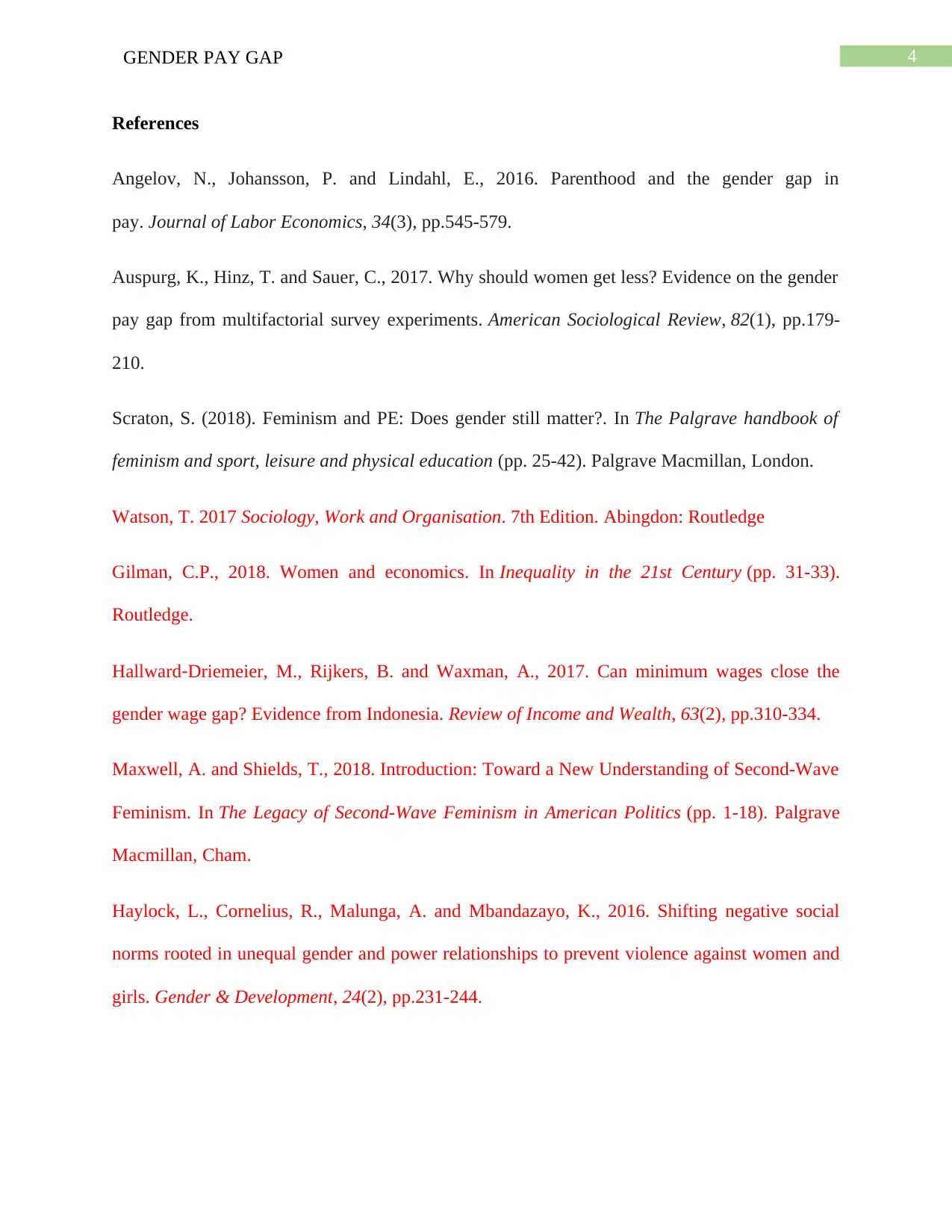
4GENDER PAY GAP
References
Angelov, N., Johansson, P. and Lindahl, E., 2016. Parenthood and the gender gap in
pay. Journal of Labor Economics, 34(3), pp.545-579.
Auspurg, K., Hinz, T. and Sauer, C., 2017. Why should women get less? Evidence on the gender
pay gap from multifactorial survey experiments. American Sociological Review, 82(1), pp.179-
210.
Scraton, S. (2018). Feminism and PE: Does gender still matter?. In The Palgrave handbook of
feminism and sport, leisure and physical education (pp. 25-42). Palgrave Macmillan, London.
Watson, T. 2017 Sociology, Work and Organisation. 7th Edition. Abingdon: Routledge
Gilman, C.P., 2018. Women and economics. In Inequality in the 21st Century (pp. 31-33).
Routledge.
Hallward‐Driemeier, M., Rijkers, B. and Waxman, A., 2017. Can minimum wages close the
gender wage gap? Evidence from Indonesia. Review of Income and Wealth, 63(2), pp.310-334.
Maxwell, A. and Shields, T., 2018. Introduction: Toward a New Understanding of Second-Wave
Feminism. In The Legacy of Second-Wave Feminism in American Politics (pp. 1-18). Palgrave
Macmillan, Cham.
Haylock, L., Cornelius, R., Malunga, A. and Mbandazayo, K., 2016. Shifting negative social
norms rooted in unequal gender and power relationships to prevent violence against women and
girls. Gender & Development, 24(2), pp.231-244.
References
Angelov, N., Johansson, P. and Lindahl, E., 2016. Parenthood and the gender gap in
pay. Journal of Labor Economics, 34(3), pp.545-579.
Auspurg, K., Hinz, T. and Sauer, C., 2017. Why should women get less? Evidence on the gender
pay gap from multifactorial survey experiments. American Sociological Review, 82(1), pp.179-
210.
Scraton, S. (2018). Feminism and PE: Does gender still matter?. In The Palgrave handbook of
feminism and sport, leisure and physical education (pp. 25-42). Palgrave Macmillan, London.
Watson, T. 2017 Sociology, Work and Organisation. 7th Edition. Abingdon: Routledge
Gilman, C.P., 2018. Women and economics. In Inequality in the 21st Century (pp. 31-33).
Routledge.
Hallward‐Driemeier, M., Rijkers, B. and Waxman, A., 2017. Can minimum wages close the
gender wage gap? Evidence from Indonesia. Review of Income and Wealth, 63(2), pp.310-334.
Maxwell, A. and Shields, T., 2018. Introduction: Toward a New Understanding of Second-Wave
Feminism. In The Legacy of Second-Wave Feminism in American Politics (pp. 1-18). Palgrave
Macmillan, Cham.
Haylock, L., Cornelius, R., Malunga, A. and Mbandazayo, K., 2016. Shifting negative social
norms rooted in unequal gender and power relationships to prevent violence against women and
girls. Gender & Development, 24(2), pp.231-244.
1 out of 5
Related Documents
Your All-in-One AI-Powered Toolkit for Academic Success.
+13062052269
info@desklib.com
Available 24*7 on WhatsApp / Email
![[object Object]](/_next/static/media/star-bottom.7253800d.svg)
Unlock your academic potential
Copyright © 2020–2026 A2Z Services. All Rights Reserved. Developed and managed by ZUCOL.





